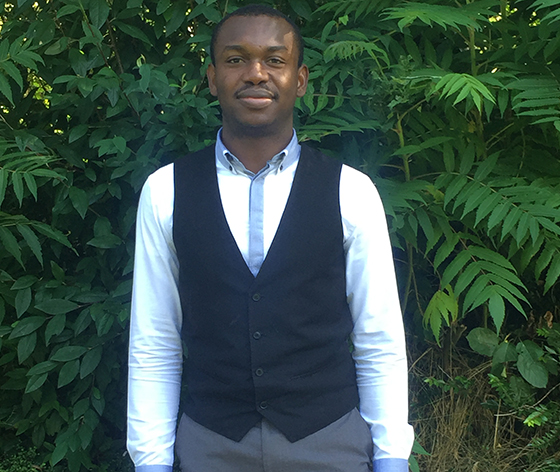A PhD student’s research into simpler and faster ways of identifying counterfeit medicines has earned him a prestigious award.
Counterfeit medicine is a global public health problem, and John Ogwu’s work at De Montfort University Leicester (DMU) will improve safety for consumers and could even save lives.
The 30-year-old has won the Geoffrey Phillips Analytical Science Award, which celebrates innovative pharmaceutical research.
The prize was awarded following John’s presentation at the APS International PharmSci Conference in Glasgow yesterday.
John said: “I feel very proud. It is really good to know the work is appreciated out there.”

Just about to start the final year of his Pharmaceutical Practice PhD, John is working under the supervision of Dr Sangeeta Tanna and Dr Graham Lawson.
He is screening painkillers and antimalarials in tablet form to see if they are what they say on the packet. With further development, the same screening method could potentially be used for other medicines such as anti-cancer drugs, antivirals and antibiotics.
Around one to two per cent of medicine in general use in the UK and USA could be fake, while the level in developing countries is reported to be over 30 per cent. More than 50 per cent of medicines bought over the internet, including vitamins, are not as claimed.
If a tablet has less or more of the active ingredient, consequences range from not having the desired therapeutic effect, to drug resistance, spread of disease and even death.
RELATED NEWS
DMU PhD student beats competition to present life-saving research at Parliament
Find out what DMU could offer you at our next Open Day
Zain focuses on future of pharmacy to win national competition
John said: “The higher the demand for a medicine the more likely it is you’ll get a fake.
“Conventional methods are expensive and take longer to analyse the medicine – you have to extract the active ingredient using chemical solvents.
“With our method, you just crush a tablet, pop it into a portable ATR-FTIR machine and it gives you a fingerprint unique to that medication. You compare it with the reference sample and it takes seconds.
“The faster we get these medicines off the market, the safer the consumer is.”
This research could help people across the globe.
John said: “It’s not just about how much is in your country, counterfeit medicines could affect anyone anywhere.
“Someone taking fake antituberculosis drugs in a developing country could pass on the disease to someone from a different country, causing it to spread.”
John, originally from Nigeria, first came to DMU to study for his master’s in Advanced Biomedical Science, attracted by the course content. After taking a year out, he returned to Leicester for his PhD, and would like to build on his current research after completing his final year.
He added: “It is something that affects everyone and we always need to keep medicines safe.”
Posted on Monday 5 September 2016